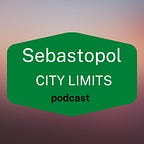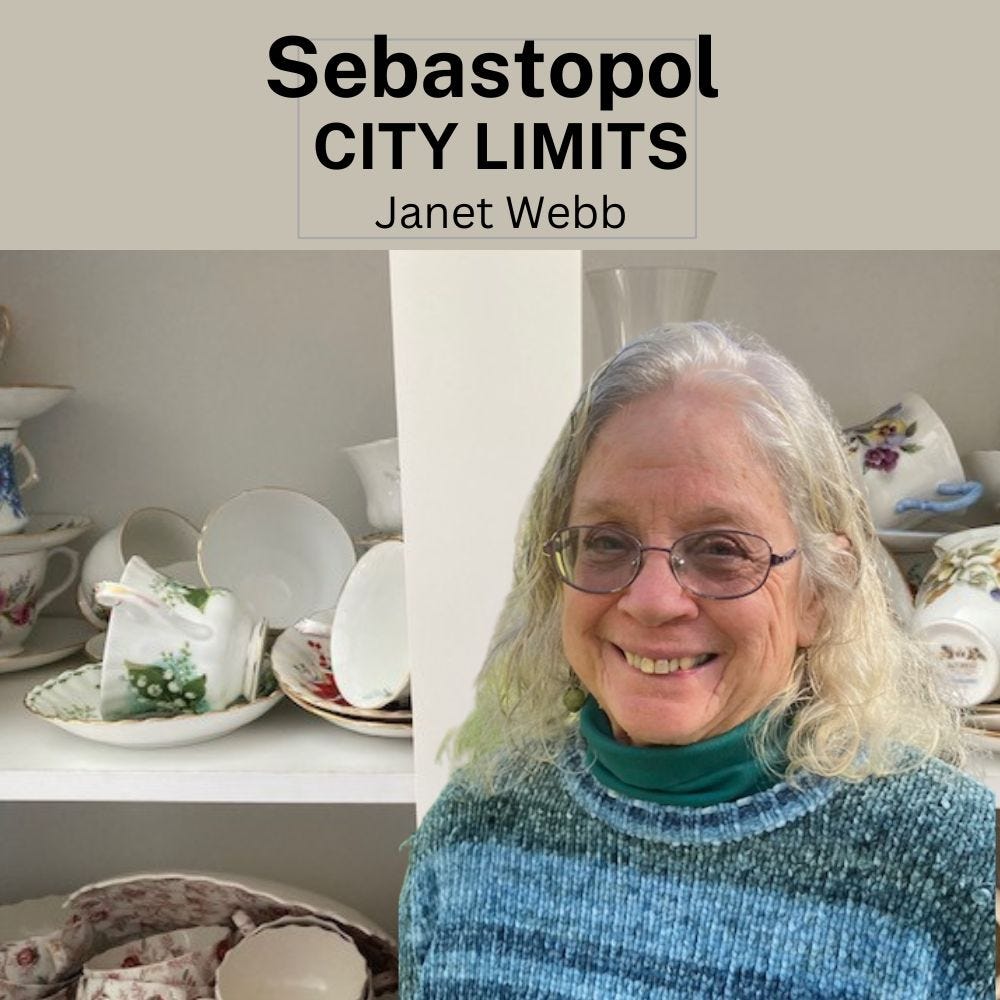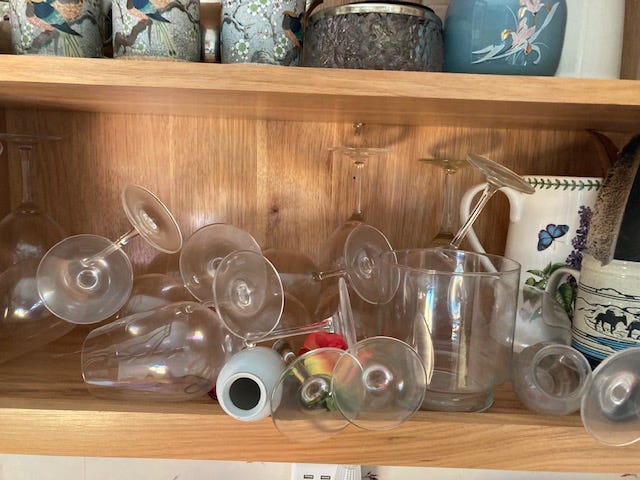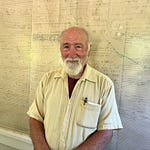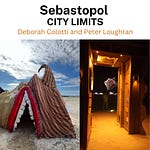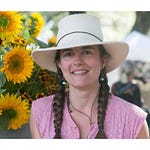Janet Webb recently shared her experience of the 6.4 earthquake that happened on December 20th in Ferndale. Skip Jirrels, head of Sebastopol Ready, which organizes MYN, invited Janet who lives in Sebastopol to speak at a meeting of the MYN group about what happened and what lessons she learned from the emergency. “I didn't do as well as I would've hoped,” she said candidly. This podcast is based on a lightly edited recording of MYN meeting of January 12th.
Links for more info:
Sebastopol Ready is a program funded by the City of Sebastopol through the Sebastopol Fire Department.
About MYN — Map Your Neighborhood which is now called Meet Your Neighbors encourages people to work together to plan for emergencies and prepare to handle issues locally. You can sign up to learn more about the program and get involved in organizing your neighborhood.
Two types of radios are mentioned and recommended by MYN: FRS (Family Radio Service) are inexpensive walkie-talkie handheld radios for communication in your immediate area; GMRS (General Mobile Radio Service) require a license and have a greater range; FRS and GMRS radios can talk to each other on the same channels.
Transcript:
On December 20th, 2022, a 6.4 magnitude earthquake hit Ferndale in the middle of the night. Janet Webb, a Sebastopol resident was in Ferndale and she was jolted awake. As you'll hear, Janet's experience was quite ordinary. She and her family were not injured, but they were shaken and they had to figure out what to do without lights and heat and limited cell service. It is not unlike the experience of many in our area during the January rainstorms, except for the aftershocks.
Janet is involved locally in MYN, which stands for map your neighborhood or meet your neighbors, but it's a project of Sebastopol Ready and it's concerned with preparing citizens to help themselves and each other during an emergency. Janet had been trained in what to do, but she still felt she didn't know what to do when the time came.
The head of Sebastopol Ready, Skip Jirrels, invited Janet to talk to the MYN group at a recent meeting. This episode is based on a recording of that session.
Janet: Okay. Hello everyone.
I want to start by describing the earthquake itself and its aftermath. I believe that there's some patterns that are followed that you may or may not be aware of.
And I want to talk to you about my actions as they relate to the nine steps in our MYN program. What I did wrong. I did a bunch of things wrong. I admit right away. I did things right. I had questions and felt that there were lessons learned that might be worth sharing with you. I hope so.
As a way of a background, there are three tectonic plates that meet just off of Humboldt County Coast, and they stretch north into Canada. It's the North American plate, the Gorda and the Cascadia. And so it's a very active seismic area because these three keep bumping into one another.
And Ferndale has a history of frequent earthquakes. Some are quite large. They've sustained major damage over the years. Our house, we have a second home there. Our house is in the downtown area. It's by the cemetery. It was built in 1885. So it's been through a lot of tremblors over its lifetime and we have felt many small earthquakes. We've had to rush up there to check on the place after a, a significant one.
But this one we happened to be there in town doing Christmas things, and this is the worst earthquake we'd ever experienced. It was a 6.4 magnitude and it struck at 2:34 AM and most folks were asleep and we were awoken by a severe jolting. The bed was jumping around. There was a very loud noise, and it lasted a long time. We guessed 30 seconds, but I have no way of verifying the length, but it just seemed to go on and on.
The electricity went out immediately, and that was soon followed by sirens. Miraculously I think it's a miracle-- my flashlight was still on the nightstand, but I could not find my glasses. I did find them on the rug amongst all the things that had fallen over, fallen onto the floor.
Nobody in the our family were injured. We were just frightened. We managed to remain calm. So my son and I walked around from room to room. We went with our flashlights, looking at everything that had fallen on the floors and slid across the counters. They tumbled over, they hadn't broken. Pictures were dangling. The TV was on the floor, but the things I had secured by museum putty, all remained upright. So that did work.
We went outside onto the porch and it was pitch dark. It was a cold, dark, low drippy fog of a night. It was really a miserable circumstance. We could see neighbors with flashlights going from room to room but no one else was on the street. We could not, we did not see any wires down.
And so it was pretty early on in the process that I thought about if I was in Sebastopol, I'd be putting an okay sign up and going to the gathering site. And it wasn't a nice warm, sunny afternoon, so it would not have been pleasant to have done that.
In the morning we walked downtown, we'd walked down Main Street looking in the windows, the shop windows, and all the damage. And the merchants appeared like they were in shock. I'm sure they were. They'd taken such a terrible hit. One store owner came out as we were looking at her smashed window display, saying everything inside was broken. And she did sell a lot of glassware, I'm sure it was horrible.
There were windows that were in shards on the sidewalk. The refrigerator unit doors in the grocery store, it shattered some, not all of 'em, but a lot of 'em. And they, they had even, it was early in the day, they already had a "cash only" sign up. So we learned from passerbys that Fern Bridge, which is a bridge built in 1911. It's a historic treasured uh, entrance into our town. And, but that it had buckled which just, it seemed unbelievable. And the only one other road that to get out of town that was a landslide on it. So we were isolated.
The power was out all over Humboldt County. These are things we learned were just from people walking on the street that we stopped and talked to.
A major transformer had blown, somehow something had happened to it. The epicenter was between Ferndale and Rio Dell, so it was only six miles from us. There were many aftershocks. They just seemed to keep coming. And I was in shock, I felt. So our daughter was able to reach us early in the morning.
Luckily before cell service ended, we received some texts and people checking on us, including some from our mid Lynch road group, which I was grateful for, but we could not call out. And our texts failed to send and wasn't long before there was nothing at all. And we were not able to get a radio station. We could just get music. I had the call numbers of the local radio station. They were just playing music. It was, it seemed crazy that way. The myshake.com app, it only posted the initial quake and if there was a warning signal, we didn't hear it, in all the noise that Mother Earth was making. It did not post any of the aftershocks. And some of them were quite strong.
Let's see, our water was safe to drink. The propane tank was not leaking, but we had no heat because of the thermostats weren't working and it was bitter cold. We were glad we had filled up the gas tank earlier in our trip because there were no gas stations operating.
And I don't know how many times I dived under the kitchen table and hearing the sound of dishes clanking in the cupboards. So all this happened on at the winter solstice, the day before the winter solstice. It was the shortest, coldest, drearious day followed by the longest darkest night and a night that seemed to go on forever.
We had three lanterns, which we had always felt were adequate, but it turned out, they gave out very poor light. We had one that was a cranking one, and about every 15 minutes we had to crank it up again. So that was getting tiresome. We were reluctant to put out candles because we thought they might fall over and I was able to heat up some leftovers. But we have a little dog, a chihuahua, and he kept walking around in circles and I'm sure he was feeling aftershocks and it seemed all during the night, he was walking all over the bed and we were feeling the bed moving around. It was very difficult sleeping.
So the next day it seemed like everyone went from shock to sadness. There was a very sorrowful mood around the town. It was Christmas season, is the best time for the merchants. That's when they make most of their money. And now you cannot even get into the town and their products were destroyed and wanting to leave their own areas, let alone come there to Christmas shop if they could get there.
We learned through the newspapers that there was widespread damage, especially in Rio Del, which was our neighboring town. Their water system had failed. So the main pipe had broken away from the tank. We heard there were two deaths, and these were with people who had needed medical assistance and the EMTs did not get there in time.
The slide was clear. So we knew we could leave for home that day and we were ready to get out of town, believe me. We got a cell phone signal from the top of Cemetery Hill and let people know, acknowledge some of the people who had reached out to us. So we were okay and we'd be coming home.
So then we had to button down the house, knowing full well there was going to be a lot of aftershocks and we were being warn that they could be really significant. And so we unplugged as many appliances as we could. We unplugged lamps and the television, laid the TV and the lamps on the floor.
We cleaned off most of the surfaces. There was no point letting them fall off again. We placed precious breakables onto the rug, or a lot of them were just there on the rug already. Barricaded things onto the couches and the beds, and rolled things up in towels. We just did the best we could to protect as much as we could because we did not know when we would be able to return.
I had a method of tying our cupboard doors together. The doors that we have two opening outward and there's knobs. And I tied them with shoelaces and I've always done that. And that held, kept dishes from falling out. Now in our China cupboards, I could see through the glass doors that things were broken, but I just left them as they were.
There was not much else I could do. So that being said, we left around noon and hoped for the best. And we've not been able to return. The storms make the road treacherous and there's widespread flooding on the Eel River. But what I thought a lot about our map your neighborhood program and the nine steps and how I fit into following these nine steps.
So I'm going to run through them all and tell you what I did and didn't do.
Take care of loved ones first. None of us were hurt, but we were frightened and it was very unnerving, especially the aftershocks and the rattling sound and the sirens and the deep darkness. It was very uncomfortable.
I think we were all in shock and our brains were not registering the checklist of what we should be doing, frankly, in spite of all the training I've had and all the teachings I have done. Marion has called it Your Brain Going to Mush. Meet Mush Brain because I didn't do so well, as well as I would've hoped.
Number two, dress for safety. We stayed in our pajamas. And our gloves, our sturdy shoes, emergency radios were nowhere near the bed. We had no hardhats up there or headlamps or reflective vests and no bags under the bed. So all that I have here in Sebastopol but we did not-- totally neglected doing that up there.
Number three, check the gas. This, I still cannot believe that this happened. We did not check the propane tank until the morning. And luckily there was no leak, but that could have been a big problem. I could see the pilot lights were on, but anyway, failed there.
Number four, shut off water at the main house, and we did not do that. We have city water there, was running clear. Water company serviceman drove by that I hailed, and he said the water was fine to drink. They had no problems with it, unlike in Rio Dell. We have an electric water heater. It's strapped to the wall, so it didn't go anywhere. But what was I found so interesting is that the water in it remained warm the 33 hours that we were there without electricity.
So we were able to wash. I found that curious. That stayed warm. A neighbor lady said her water heater broke and flooded her basement. So broken water heaters. I did hear about an another person who had a broken water heater.
Now, number five, that is place your help or okay sign in a window. We did not do that because there was nobody checking to see if anyone nearby was okay. The volunteer fire department and the police department totally had their hands full, actively helping the 911 calls. I did not see interaction among the neighbors. It was only the few times that I walked the dog that I talked to anybody and found out some things.
I think our acquaintances just may not have known we were in town. The tractor parade had ended. We would normally would've left. But I did not, I could not call him, I didn't call him, I didn't try to drive across town, so no one checked on me, but I didn't check on anyone else.
Let's see. Bring the fire extinguisher to the curb. That didn't even cross my mind. The neighbor lady across the street said that their wood burning stove broke away from the flue and slid across the floor and there was still burning embers in the stove, because that's their only source of heat. They always have wood, that wood burning stove going. So thank heaven that didn't catch on fire. There were no fires in the vicinity that I was aware of.
Seven, go to the gathering site. There was no gathering site to go to. And I had thought about this really early on, about how I would have to go down Lynch Road to our gathering site. And as leader there was no, not going but it really, in all honesty, seemed like a really unpleasant thing to do in the wee hours of the morning. It was so dark and cold and wet. But I had to wonder, I started wondering how many in our group would actually go there. So we've made this serious commitment that may not be followed through on by everyone.
So number eight, form teams. So some of this is redundant, I'll go over. It doesn't hurt to go over it either. Team one would stay at the gathering site and ours is a carport to monitor the radio coming in from those checking on the neighbors emergency alert system on our hub that we have and keep everybody informed. And team two, the people checking on the neighbors might need an ambulance. Or find a tree or wires down and team one would need to relay for help. So our group, mid Lynch Road group only has FRS radios. We have five operators. But frankly, we all failed the test that we had over the weekend where none of us could lock onto Channel 17. So we, this need for GMRS radio is very strong and will happen soon.
But it was so weird that in Ferndale we couldn't even get a radio station. I did go to the market and get a Eureka Time Standard and the press Democrat had a lot. It seemed like other people knew more happening than we did. But since there really was no cell phone service, how would we contact out of the area relatives and whatnot. I don't know.
So another observation is that team two would go from house to house looking for the signs and checking gas leak, and responded back. Frankly, again, in all honesty, I always assumed it would be the men folk who would do that. But we only have one male radio operator, so some of us gals would have to go along with them.
It just seemed more efficient for them to have a copy of the maps and the people living in it on a clipboard in some waterproof sleeve or something. So we could just be at the gathering site and teams are formed, we can hand to them. All of us have maps, but something as convenient of having them on the clipboard to walk around and check it off is we just don't have, and we have new neighbors now, so the map needs updating.
So with team three would go to the care center. Now the care center, our care center is the house that is the carport goes along with. Someone might need to get an injured person to the care center for first aid. So knowing some first aid or knowing first aid comes in, but the children and the elderly or disabled are supposed to go to the care center, but they just might not be able to do that. I know my husband's disabled. He could not walk there. And the parents might want tostay with their children at home rather than go down the street. It all has to do with the timing, when or what else is happening but it's so unknown.
So I think we need to take a closer look at the demographics of our neighborhood because when we started, people were obviously a lot younger and there were very few children, and now we got kids all over the place and a lot of seniors.
So number nine is the teams go back to the gathering site and keep everybody informed, et cetera.
In conclusion, I want to say a little bit about Ferndale. It's a small, and it's a very tight knit community, and it's earthquake prone. So all these people have been through this so many times. So the procedures are most likely already loosely in place to help each other. But I want to have conversations with my friends about what is that? What do you do during and in the aftermath? There's sure some automatic things. They have --what was referred to by the fire chief, that the locals have what they call a lived experience, that they have a knowledge of what to do and when to do it. They just know and they know that after the initial event, that's just the beginning, that aftershocks are going to happen.
They have continued to be happening in the three and four Richter scale range. And just our New Year's Day, there was a 5.4 quake that shook and it shook the area differently, where a different end of town was damaged than had been initially. So they seem to keep coming.
To initiate a map your neighborhood program there, it would take longtime residents and key residents to start it. There's movers and shakers, especially the old families that live there; it would have to come from that type of a group to get every-- it just seems really like a daunting task, but when I go there, I'm going to be sharing what it is we do here and maybe someone will listen and want to know more.
We have not been able to go up there since because of the storms. And there's widespread flooding on the Eel River. So these dairy people have besides getting hit with this earthquake are flooded and they're moving their cattle to the fairgrounds or somewhere else safe. There's lots of problems there in that area, an area I love dearly. So thank you for listening.
Great.
Skip: Thanks, Janet. Wow, that's a great, that's a great report. Quite the experience. Questions to, I have a lot of things written down but questions from you all right away about the information, not just about Ferndale, but a lot of really good comments about MYN and functionality of MYN and whether it might work or not.
Janet: Kenyan.
Kenyan: Yeah. I was wondering how, so did you say that cell service as far as calling, went out immediate?
Janet: Fairly, yes. We could not call out and I don't know how people were able to call in or if it, maybe it was sporadic and they just hit it at the right time.
Kenyan: And then you could receive texts for some period of time. Then did that stop after a number of hours?
Janet: I don't know if I said that PG&E did text, that the power would be out to late the following afternoon. So some were getting in, but everything I tried to send out failed.
Skip: Are there questions?
Member: I have a question. With an earthquake that severe, were you worried about the house falling off the foundation? I've done a lot of home inspections and stuff. How do you know it was safe or how did you feel it was safe to stay in?
Janet: As I mentioned, the house had been through so many earthquakes and that I think pre previous owners had beefed up the attachments to the foundation. And we didn't feel or notice any slippage. And it seemed like of those homes that did slide off the foundation in Rio Dell, they were not as well constructed. And that town has tends to have a poor, poorer economic base and poorly constructed homes on it. I'm not surprised that happened there.
Skip: So I've got a couple of questions if nobody else does. One of which, Janet, is that you said that you had some lanterns, one of which were the crank type. but they, and all of them gave off poor light.
Janet: On one of 'em, we changed the battery and it helped, but the cranking things, we were like, oh, look at this. We just have to crank it. Our arms were getting tired, we were cranking it so much, passing it around from one to another to cranking that darn thing,
Skip: I can understand. It's really true. You only get a little bit of light or a little bit of radio if that's what you're listening to if you have the crank type. I bring that up because I have some smaller lights, and different kinds of lights that are actually quite powerful and I feel like they really do fill up a space with light.
So I was curious about that. So the battery ones, if you were able to change the batteries it did at least improve the light that they were putting out.
Janet: Yes.
Skip: Because you did mention, I believe, nicely worded also, a cold night. And pretty darn dark. I don't think you said pretty darn dark, but it was dark.
Janet: It was very dark. Had there been no cloud cover the constellations and the Milky Way would've been marvelous.
Skip: Going to a gathering site or checking on your neighbors, you've said, I think a couple of different times, just in the moment, just didn't really seem to make sense, or in hindsight it didn't really seem to make sense for you to do that in the moment because of this cold, dark, damp.
Janet: We're only up there for short periods of time once a month. And even though we've been there a long time, we're not locals. We never have been, we're just outsiders. Always have been considered outsiders because of that. And no it would've been very uncomfortable to have gone around knocking at barn doors. And as I said, no one came to seem interested in what we were doing.
Skip: I think that's a really important point, and I want tocome back to that. Pam.
Pam: Thank you. I think you're just about to go there, Skip and say this, but Janet, don't be so rough on yourself. You weren't in a neighborhood where everyone had met one another. And I think this, that this gives fabulous credence and substance to all that we're doing the planning and even if everything doesn't go seamless and perfect and beautifully, just the fact that many of us in our own neighborhoods have reached out and we've touched base.
And even if it's a little herky jerky and, maybe not as smooth as we'd like it to be, I think it's great that we've done as much as we have. I think there's in terms of the lessons learned. Yeah. Geez. Keeping stuff charged, keeping the gas tanks topped off, like you did fortunately. Keeping lanterns, water, all that stuff that we do. Goodness gracious. I just am sorry you had to go through such a cold, dark, long night. I wish you had a wood burning stove.
Skip: Like one of the things you mentioned was that you felt like that you were personally in shock. I understand that you're a mature person and you've been through things in your life, but in those moments that you really felt like you, you were in shock and I think that's an important point for all of us to be aware of. Any idea, did that go away slowly? Did it not go away at all, or what happened that sense?
Janet: I wouldn't have named it being in shock at the time. That was more of a of, in hindsight and also reading local reports, how everyone's traumatized by it and so forth.
As the aftershocks went on and I kept jumping under the kitchen table, I was getting more and more nervous about it all. But I think shock part was, is that I didn't do all the things that I probably should have done. Just really didn't, honestly, didn't cross my mind.
Skip: There's lots of good reason and I agree with Pam about trying not to be hard on yourself, but Mercy, you had your hand up and you were.
Mercy: This is really good information, Janet, because a lot of the things that I have envisioned of, thinking through, don't include cold, dark nights. The idea of going to meet in the dark when no one has light, it's like plan B kind of needs to be thought about.
What I was thinking when you were speaking is, it's all the more reason that having more people have the FRS radios because then that's not dependent on other networks. It's local. You're able to check in on people without having to leave your home. I've never used that as an encouragement to have more people in our group get, get with that part of the program, but I'm going to.
Skip: So I think, one of things, and Mercy, I think you're addressing it too is almost not why but when is it that we would think to check in on another?
And part of that, when in my mind anyway is revolves around, do I know them? , am I familiar with them? Do they, have I established any significance with that particular person? And if I haven't, no harm, no foul that I haven't. But if I have, would I be more inclined to make a connection with that person?
Would I be more inclined to check on them? Would they be more inclined to check on me? I think that's a sort of like at the root of MYN is that sense of familiarity is supposed to help during those first moments, as they talk about it on the DVD, the first 60 min, the golden 60 Minutes. Like what happens in the first hour.
So I think this is all just really important and helpful information. Anybody else have thoughts or questions? Mary Lou?
Mary Lou: I find that interesting, but I also personally realize that with these last storms, our power went out and everybody's power that I know of went out and and here I'm thinking that we are all prepared for whatever and all of our batteries were not good, so we turned our lights on and there was no batteries. Now we do have a backup generator here because we're in a part of the county where, as you say, we're not a top priority to be reinstated with power. And we knew with all the wind that we would be without power.
But the interesting part about knowing who your neighbors are and connecting with them, there's a woman who lives right next door to us who's elderly on a walker and has never participated once in any of our Meet Your Neighbor meetings. Hasn't wanted to do it, and so I didn't think about her, basically.
When our power went out, when it was nasty and the wind was going and she is over there by herself. Just right next door. And the next morning, here she is knocking on our door at seven o'clock in the morning with her walker, saying, how long do you think our power's going to be out? I'm freezing. I haven't had a cup of coffee. She wasn't in any kind of shock. She was actually pretty forward about it. It was saying, when's this going to stop? And she said, I have a generator. I don't know how to turn it on. And of course we suggested one, she stay in our house and make her a cup of coffee and if she needed to take a shower, but she didn't want to do that.
So then we offered to get her generator running for, and she didn't want to do that. And she doesn't want to come to the meetings. So what I learned is one, she's going to need help. Two, she isn't going to want anybody to be involved with helping her. And three, she's not going to be prepared. So what do you do with that?
Skip: Great question. Anybody have an answer for that or a thought on that? What do you do with that situation? Renee, go ahead.
Renee: I just have an idea. I'm wondering if she were really in danger or in really dire need, she might change her mind, then she might want your help if she was really scared. She wasn't really scared, she was feeling lost a little bit. Not really scared.
Mary Lou: And I agree with that. But the problem was with that is I asked her about her phone because she was going to walk back to her house and I said, Okay, here's our number. Give me your phone and we'll put it on a-- just press the button and go. And she said, oh it's out of battery. I almost never use it.
The point is unless we forced ourselves into her house, we're not going to know because I suspect she hardly ever has her phone charging. Maybe this will change her. Maybe I can talk to her over the fence sort of thing and say, look, this could be dangerous for you.
But she's pretty independent and thinks, oh no, it's not going to hurt me. Then she's toddling down the street in the rain and wind with her walker. Anyway, it was an interesting interlude, but I still don't have an answer to it.
Skip: I'd like to say also that maybe when something's not happening, the over the fence thing, Mary Lou, that really makes a lot of sense is try to talk when it's not an issue. These are the conundrums that we have to deal with in the neighborhoods where we want to try to do things with people, but we have the people that don't want to participate.
Collectively the neighborhood needs to be able to decide what should we do about this situation? At least engage enough so that we know that we've said and done what we can. Because when the time comes, it's a damn emergency. A lot of the rules and regulations go out the window and you do the thing that you know that you need to do to take care of people, so then maybe it turns out to be a little bit of a different situation.
So Janet, thank you so much. And if you go to Ferndale and talk to them about MYN. I'd be really interested to know how that conversation goes. And if there was any opportunity for me to come and talk to any of the people there about something similar to MYN, I'd be more than glad to do it.
Janet: Thank you. I assure you that next time I go to church in the after church social hour, that's what we're going to, I'm going to bring up the subject and thank you, Skip, for making that offer..
Skip: Thanks, Janet. Really glad you're safe and thanks for bringing that information.
Dale: What can we learn from that Ferndale earthquake? Well, as best you can be prepared and expect the unexpected.

